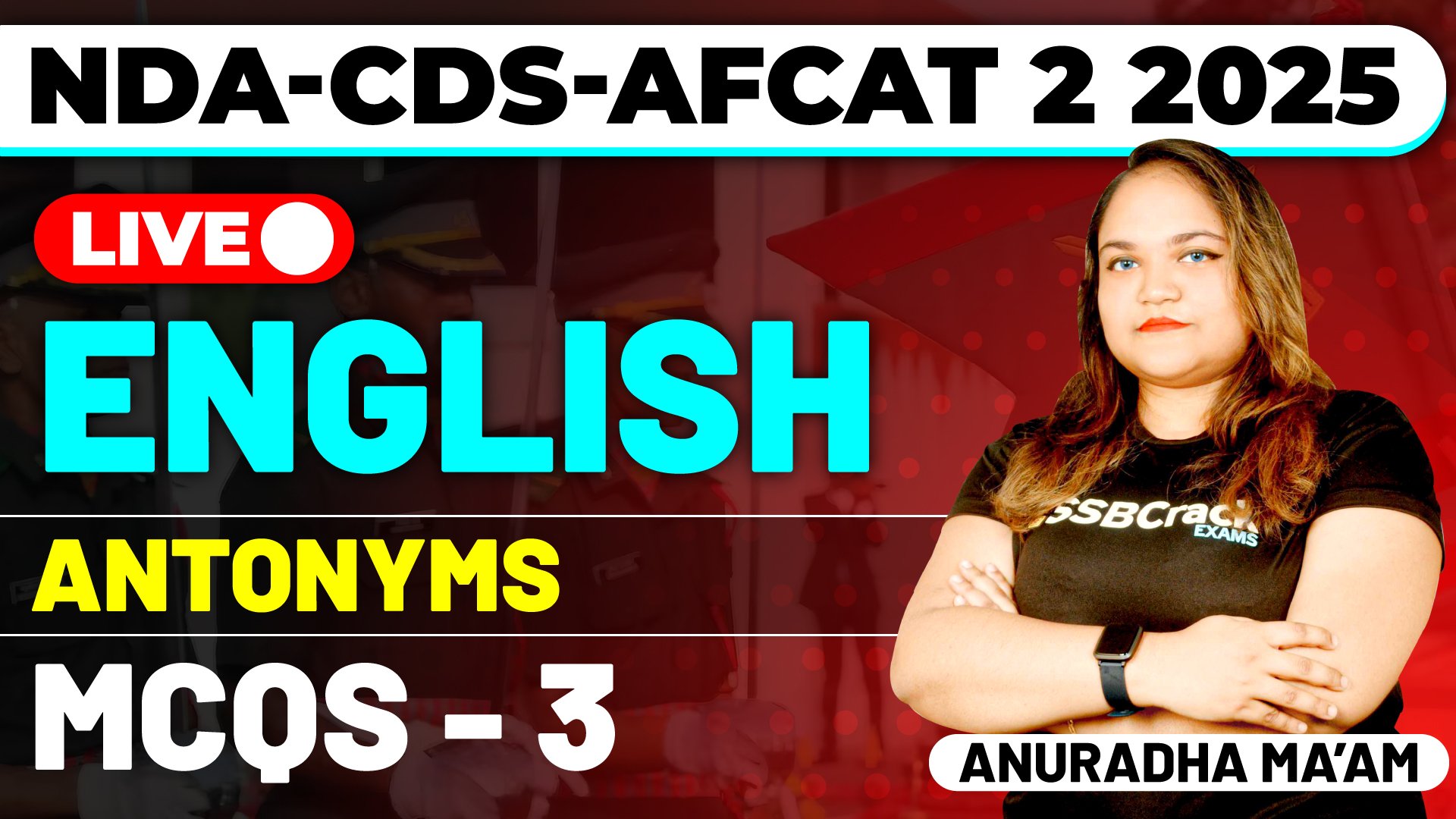The English section of defence exams like NDA, CDS, and AFCAT often determines the final merit — especially because it is both high scoring and skill-based. One topic that repeatedly features in these exams, regardless of the format, is Antonyms — words with opposite meanings.
In our Antonym MCQ Live Class 3, we conducted an intensive practice session featuring a mixed pattern of questions:
🔹 Direct single-word questions, commonly seen in AFCAT, and
🔹 Contextual sentence-based questions, often found in CDS and NDA.
This combination mirrors the actual exam pattern and helps aspirants develop both vocabulary recognition and application in context.
What We Covered in Antonym MCQ Live Class 3
This class was designed to expose candidates to both isolated vocabulary testing and contextual language understanding through MCQs.
Direct Word-Based Antonyms
Here, the correct antonym had to be selected based on prior vocabulary knowledge.
Directions: In the following questions, out of the four alternatives, choose the one which best expresses the opposite meaning of the given word.
Q) Fluster
(A) Arrange
(B) Disconcert
(C) Disobey
(D) Upset
Ans. (A)
Q) Antiquity
(A) Youthfulness
(B) Innovation
(C) Recent
(D) Common
Ans. (C)
Q) Urbanity
(A) Sociability
(B) Cruelty
(C) Crudeness
(D) Rustic
Ans. (D)
Sentence-Based Antonyms
Here, context plays a key role. Candidates must read the sentence, understand the tone and function of the underlined word, and then eliminate inappropriate options.
Directions: Each item in this section consists of a sentence with an underlined word followed by four words/group of words. Select the option that is opposite in meaning to the underlined word and mark your response on the answer sheet accordingly.
Q) The habit of squandering money should not be encouraged.
(a) discarding
(b) hoarding
(c) donating
(d) stealing
Ans. (b)
Q) His candid remarks impressed the authorities
(a) Blunt
(b) Guarded
(c) Sincere
(d) Unconventional
Ans. (b)
Q) The guilty appealed to the jury to condone his punishment.
(a) Accept
(b) Forgive
(c) Condemn
(d) Criticize
Ans. (c)
For more questions, check out NDA-CDS-AFCAT 2 2025 Exam English Live – Antonyms – MCQ Class 3
Core Skills Tested in Mixed Pattern Questions
- Recognition – Know the meaning of the word directly (for one-word questions).
- Interpretation – Understand the word’s role in the sentence (for contextual ones).
- Elimination – Discard similar-meaning words or unrelated options.
- Precision – Choose the most appropriate opposite in tone and usage.
These abilities reflect not just exam skills, but also communication effectiveness — a key trait for future defence officers.
Why Mixed Format Practice is Essential
- AFCAT aspirants often prepare only for direct vocabulary — sentence-based questions can surprise them.
- CDS & NDA aspirants must know both formats, as exam patterns now integrate variety.
- Mock MCQs in Live Class 3 helped students avoid over-reliance on rote memorization and focus on language logic.
Preparation Tips for Antonym Mastery
- 🔍 Read daily editorials – Note unfamiliar words and find both synonyms and antonyms.
- 🗂️ Create a contrast list – Maintain a running list of commonly asked antonym pairs.
- 📝 Practice in both formats – Don’t focus solely on word lists. Attempt sentence-based exercises as well.
- 🧠 Use context clues – Look for contrast markers like “however”, “despite”, or “but” to decode sentence meaning.
Conclusion
Our Antonym MCQ Live Class 3 served as a bridge between direct vocabulary recall and applied language comprehension. By mixing formats in our practice session, we gave students a holistic toolset that aligns with the evolving question trends in NDA, CDS & AFCAT exams.
The key to cracking the English section isn’t just knowing words — it’s knowing how to use and understand them in context. And that’s what makes antonym mastery such a vital part of your preparation journey.







